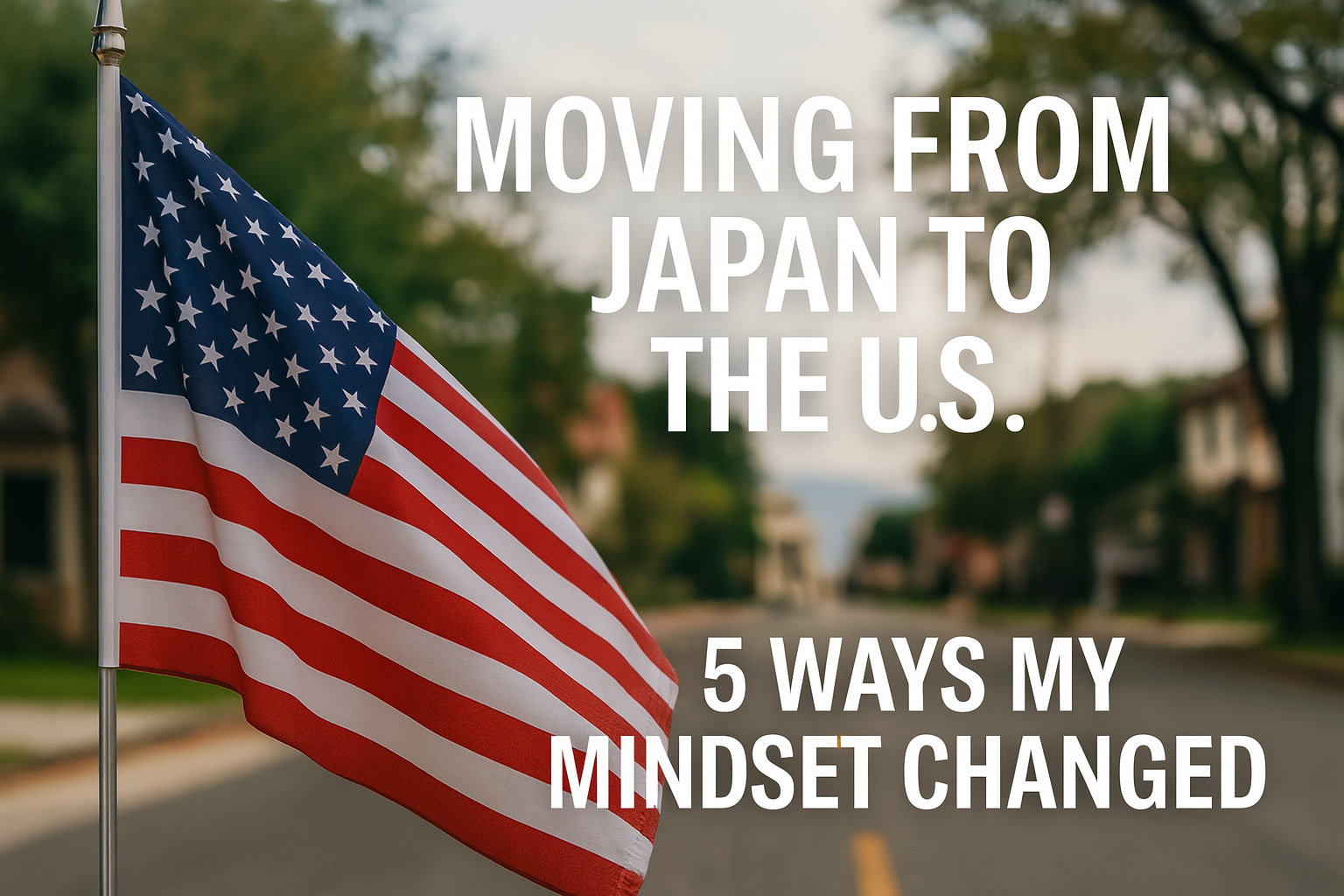Moving from Japan to the U.S.: 5 Ways My Mindset Changed

Things I Noticed After Moving to the United States
Hello, this is Suzuki from Eco Drive.
It’s hard to believe, but it has already been 20 years since I moved to the United States.
As you’d expect in a different country, the rules and environment aren’t the same, so my way of thinking has changed in several ways compared with my time in Japan.
I’d like to share some of those insights with you today.
The videos embedded in this article are narrated in Japanese, but English subtitles are available.
Lifestyle Changes I Noticed After Moving to the United States (1)
I’ve noticed about ten changes in my habits, but first I’d like to discuss the following five.
1. Started exercising regularly
2. Stopped thinking in terms of age
3. Re-evaluated Japan’s strengths and concerns
4. No longer feel embarrassed when speaking English
5. No longer feel the need to pretend I’m someone I’m not
1. Started exercising regularly
First of all, I definitely exercise more often now.
I think the drastic change in my living environment has made me more conscious of exercise and health.
When I lived in Japan, I felt there wasn’t much of an issue even if I didn’t actively play sports.
That’s because using trains and buses means you’re getting daily exercise without even realizing it.
I only noticed after moving to the United States that my daily commute had actually been a built-in workout.
So what’s life like in the U.S.? Because most things revolve around cars, you end up walking far less.
In other words, my overall activity level drops dramatically compared with when I was in Japan.
Effects of a Car-Centric Society: Hardly Any Need to Walk
In California, the moment you step outside your home, you almost always have to rely on a car to reach your destination.
At work, where most tasks are desk-based, the lack of exercise becomes even more serious.
And let’s not forget about food.
Portion sizes are larger than in Japan, so even though you’re moving less, you’re eating more…
which can easily turn into a worst-case scenario.
Exercise Is Essential for Daily Health
Given this situation, I started working out out of a sense of urgency about my health.
In particular, I began incorporating exercise as a hobby on my days off to balance my weekday desk-bound lifestyle.
For example, I’ve made it a habit to go cycling on Sundays, and it has become my weekend highlight.
And starting to work out not only boosts my stamina but also gives me a sense of mental fulfillment.
Living in a new environment has made me realize just how important exercise is for staying healthy and living each day to the fullest.
2. Stopped Thinking in Terms of Age

I believe the concept of age is perceived very differently depending on one’s culture and surroundings.
Living in the United States, I’ve noticed that compared with Japan, you become aware of age far less often.
In the U.S., asking someone’s age in everyday or social situations is considered such a breach of etiquette that it’s practically taboo.
I don’t remember holding that mindset when I was in Japan.
How Americans View “Age”
In Japan, it’s common to ask someone’s age on application forms, surveys, and even when meeting for the first time.
By contrast, in the United States there’s often no space for age on a résumé, and in daily interactions people generally don’t care how old someone is.
Because of this cultural difference, friendships easily cross age gaps—10, 15, or even more years—with everyone interacting as equals, free of hesitation.
Fewer Preconceptions About Getting Older
This background helps reduce preconceptions and biases about growing older in the United States.
Age-based restrictions or expectations implied by phrases like “You’re too old for that,” which you often hear in Japan, are seldom encountered in the U.S.
From children to seniors, people of all ages enjoy the same activities, and this attitude seems to have a positive impact on society as a whole.
3. Re-discovering Japan’s Strengths and Areas for Improvement
Living away from Japan makes the country’s merits and challenges stand out more clearly.
I suspect many people who have spent time abroad share this feeling.
When you first begin life outside Japan, the differences in your new surroundings can be overwhelming, but as time passes, Japan’s wonderful qualities—and, conversely, the areas that could use improvement—come into view.
Realizing Japan’s Appeal by Living Abroad
When you live overseas, you come to realize that things you once took for granted—Japan’s orderliness, the cleanliness of public spaces, and the meticulous quality of customer service—are actually exceptional.
You also grow to appreciate Japan’s year-round natural beauty, cultural richness, and seasonal traditions as part of the country’s unique charm.
In many cases, experiencing life abroad makes these positive aspects of Japan stand out even more clearly.
Conversely, Noticing Areas for Improvement
On the other hand, stepping away from Japan also highlights Japan-specific challenges and aspects that could be improved.
For example, in a country like the United States, the culture puts a premium on rationality and efficiency. Experiencing this can make you realize that various Japanese systems and customs are sometimes inefficient.
Moreover, the U.S. tends to respect individual opinions and diversity, which contrasts with Japan’s collectivism and social conformity, prompting reflection on the value of personal freedom and self-expression.
Having Points of Comparison Makes It Easier to See Japan’s Strengths and Weaknesses
By viewing Japan from abroad like this, the country’s unique virtues and challenges become clearer.
And I think that having this kind of experience makes it easier to approach things constructively—rather than simply criticizing, you start thinking about how to build a better society.
Experiencing these things abroad brings value beyond just encountering a new culture; it lets you re-examine your own country objectively and rediscover what makes it special.
I believe this perspective is extremely useful when living in a global society.
4. No longer feel embarrassed when speaking English

I suspect many people living overseas struggle with language barriers.
In particular, when people whose native language isn’t English try to speak it, they often feel a bit embarrassed.
However, after moving to the United States and using English on a daily basis, that embarrassment has gradually faded for me.
The Most Important Thing When Speaking a Foreign Language Is Communication
At first, I felt pressured to speak perfect English, and the very act of speaking became something I feared.
I often worried that using imperfect English might offend others or be considered rude, which made my voice shrink and my confidence waver.
However, living in the United States taught me that the most important part of a conversation is not flawless grammar or pronunciation, but mutual understanding.
English-speaking Countries Have Accents (Dialects) Too
In American culture, differences in English accent and pronunciation are seen as part of diversity, so even if your English isn’t perfect, most people simply recognize that you have a different accent.
This may vary by state, but at least in Los Angeles that’s the sense I get.
In fact, Americans themselves have different accents and even dialects depending on the region.
In this environment, the most important thing is to shed any embarrassment about your English and speak confidently.
Tips for Speaking English I’ve Learned from Experience
When speaking English, begin with your main point and use clear gestures or body language so your intention is easier to understand.
This makes communication flow more smoothly.
By projecting your voice and speaking with confidence, mutual understanding improves dramatically.
Through experiences like these, any embarrassment about language naturally fades, and confidence in speaking English grows.
I was embarrassed at first, but after actually moving to the United States, my mindset shifted in this way.
5. No longer feel the need to pretend
After moving to the United States, I came to realize that I no longer needed to put on airs.
It’s probably a feeling many people who relocate to the U.S. can relate to.
Now when I think back to my life in Japan, I realize I was often keenly aware of social expectations and how others perceived me, and I tended to place a lot of value on my appearance and the things I owned.
It wasn’t uncommon to feel pressured to signal social status by wearing luxury brands or buying products endorsed by celebrities.
In the United States, People Don’t Pay Much Attention to What Others Wear
However, life in the U.S. seems to embrace a different set of values.
In the United States, there is a culture where people feel free to express themselves, and they show little interest in others’ possessions or appearance.
Even if you’re wearing an expensive watch, no one envies you, nor does it define your worth as a person.
In an environment like this, the mindset of “I am who I am” naturally takes hold, and you no longer need to compare yourself with others to find your own value.
The Mindset of “I’m Me and You’re You”
Living in the United States has taught me the importance of being true to myself—of living according to my own values and interests without pretending to be someone I’m not.
Rather than finding my worth in material possessions, I’ve come to believe that my inner self, actions, and choices are what truly define me.
Because of this outlook, I feel liberated from the need to “show off” that I used to experience in Japan.
You could also say I’ve lost my appetite for material things—and this mindset is much easier on the wallet. (laughs)
Can You Enjoy Cultural Differences?
When you live abroad, you often find that what used to be normal in Japan isn’t necessarily so in other countries.
Naturally, this can sometimes feel stressful, but I believe the real key is whether you can appreciate these experiences as “cultural differences.”
Our Services
We offer comprehensive automotive solutions—buy, sell, rent, and repair in one place.
Car Sales
Browse our lineup of quality used cars with transparent pricing and up to a two-year warranty on select models.
View InventoryAuto Repair
Get expert service from our certified Toyota Master Mechanic. We primarily service Toyota vehicles.
Schedule ServiceTrade-in / Sell
We pay top dollar for your vehicle—especially hybrids. Count on fair, transparent appraisals.
Get EstimateCar Rentals
Choose between fuel-saving hybrid rentals and a Tesla with Full Self-Driving Capability—both at competitive rates.
Reserve Now




